By Charlene Muhammad CHARLENEM
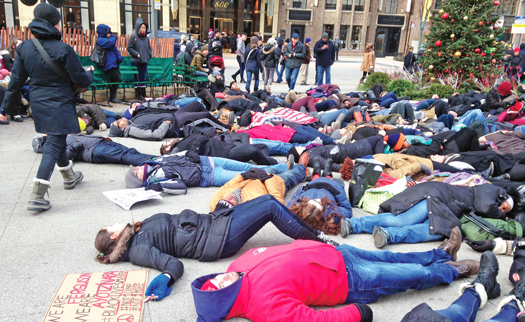
LOS ANGELES (FinalCall.com) – Coming out of the extremely successful organizing and turnout for the “Justice Or Else!” gathering in Washington, D.C., marking the 20th Anniversary of the Million Man March, is a mass mobilization for a nationwide boycott of Black Friday–the major Christmas holiday spending season from Nov. 27 to Jan. 1.
#BoycottChristmas is a major call to action coming out of the massive gathering on October 10, 2015. “We have to find a way to redistribute the pain,” said Minister Farrakhan, as he quoted Dr. Martin Luther King, Jr. during his Justice Or Else! address.
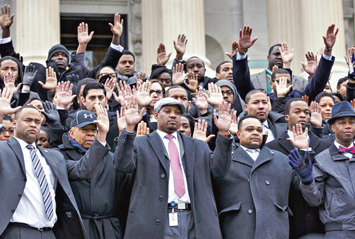
“You’re either going to treat us right, or we’re going to withdraw from you our economic support. … We intend to boycott Christmas but not Jesus,” Minister Farrakhan said. “We choose not to spend dollars on Black Friday, Black Saturday, Black Sunday, Black Monday. We are not going to spend our money for the rest of that year with those companies that we have traditionally spent our money on.”
The boycott targets Black Friday for several reasons. Blacks during this time of year spend considerable money on things they can’t afford, all in the name of worshipping Jesus, and corporations press for sales during that time of year to take negative earnings in red ink to in-the-black-profits. Santa Claus has co-opted Jesus, Minister Farrakhan has noted, and he wants to promote a proper understanding and true love of Jesus.
The boycott aspect of the movement with a great emphasis on Jesus and de-emphasis on Santa Claus appeals to people who were not even at the Justice Or Else! gathering, said Cedric Muhammad, an economist and Forbes contributor.
“There are people who may not have even heard of the march … who have a problem with the commercialization and the compulsion to have to go and spend money you don’t have every single year, this time of the year,” he said.
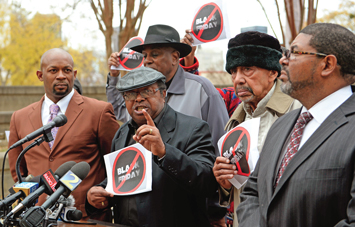
#BoycottChristmas was one of the most significant calls that came out of Justice Or Else!, said Greg Akili of the L.A. Black Worker Center and the Black Community Clergy and Labor Alliance, because it’s about Blacks uniting and expressing their disdain for mistreatment in America.
“It starts with that and it’s symbolism is that it reinforces and connects us to the coming together that Justice Or Else! calls for,” he said.
Last year, according to various reports, Black Friday sales dropped 11 percent to $50.9 billion from an estimated $57.4 billion in 2013. While analysts did not attribute the decline to boycotts by protestors who were angry and outraged over the deaths of Michael Brown Jr. (Ferguson, Mo.), Eric Garner (New York), Tamir Rice and Tanisha Anderson (Cleveland) John Crawford (Ohio), Akai Gurley (New York), and countless others at the hands of police, others argued the protests did have an impact.
“African Americans have enormous economic power. We spend around a trillion dollars a year on this, that and the other. Some of our spending is necessary–rent, food. Some of it is not necessary, and in essentially, in some ways, we are empowering the oppressor,” observed Dr. Julianne Malveaux, an economist and former president of Bennett College for Women.
“We have people who will not invest in our community, but we invest in theirs. We have people who do not open stores in our community, but we go out of our way to find their stores in other communities,” she continued. In addition, Black neighborhoods are plagued by stores that hike prices, run by merchants who ignore and disrespect Black consumers.
“If they do not feel our economic power, we’re just having rhetoric. We’re just having conversation. Blah-blah, blah-blah, blah-blah. They don’t have to do anything. They might do it out of the goodness of their heart, but there is no building of power,” Dr. Malveaux told The Final Call.
She feels the boycott possibility is important and empowering. The only issue is how many Blacks will buy into it.
Her sentiment drummed up memories of how the death of 17-year-old Trayvon Martin at the hands of neighborhood watch volunteer George Zimmerman, who was acquitted, fueled a push for a Florida boycott in 2013.
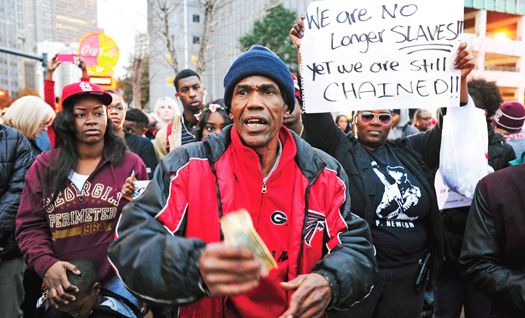
Experts discussed the need to punish the Sunshine State and strengthen the Black economy. They raised key questions, such as whether Black America’s financial divestment from the tourist state would produce a strong enough economic impact to force meaningful changes.
Some entertainers and organizations pulled events out of the state, and some small boycotts took place, such as people declining to purchase Florida orange juice, but that was as far as the effort went. Police and vigilante attacks on Black youth have escalated.
“All too often, we have these ideas, but people don’t buy into them, and we need the entire community … but if only 20 percent did it, that would be meaningful and impactful,” Dr. Malveaux said.
If people stood outside one of the targeted stores with picket signs, declared they wouldn’t shop there, then others might not shop on so-called Black Friday, she added.
“Let’s just call it the Friday After Thanksgiving, not Black Friday, because I want to attach Black people to positive things not negative things, but in any case, it also becomes some kind of cult phenomenon,” Dr. Malveaux continued.
People leave their families and dinner to stand in line for hours, to get into stores first-thing at ungodly hours, she noted. “And then people go in there and have a, excuse my language, a damn-near riot!”
Customers have been killed trying to get to sales and stores are playing bait-and-switch, she said. According to the www.blackfridaydeathcount.com, there have been seven deaths and 98 injuries on the shopping day after Thanksgiving between 2006 and 2014, such as Jdimytai Damour, a worker who died after being trampled in a shoppers’ stampede at a Long Island Wal-Mart.
“Why are you there? What are you buying? Do you need it? Does it uplift you? Did you go for the okie-doke? I mean, those are all the kinds of questions you want to ask,” she said.
Dr. Malveaux told The Final Call she likes the theme, Boycott Christmas, Not Jesus, because Christmas was never meant to be a commercial holiday, rather, a celebration of a righteous birth. She encouraged Blacks to think, especially this time of the year, what do they want to do to celebrate the birth of the Christ child, and does all of that involve consumerism?
“Now some of it will. Our little children want toys and we don’t want to necessarily deprive them, but it needs to be placed in context. … You should never go bankrupt or go into debt to celebrate holidays.”
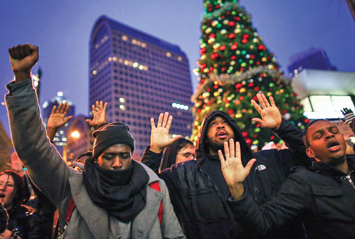
“We spend because we’re encouraged to spend because for many of the commercial interests in America, it is 50 percent of their business, that holiday period,” said Greg Akili.
He believes #BoycottChristmas will be very successful, especially if it manages to do three key things. “Explain to people what this is and why. Get them to make a decision to support you, and then, reflect on the impact right away,” he said.
Like many, he quickly named Wal-Mart as a primary target for the economic boycott, but didn’t omit other corporations who need to feel some pain.
“I would start with Wal-Mart because they’ve got a bad history anyway, and there’s a national effort to bring justice for the workers there,” Mr. Akili said.
Mr. Muhammad noted Minister Farrakhan’s call to #BoycottChristmas is not simply about money, and is more than a boycott in the political or economic sense.
“He literally is engaging in altering the behavior and psychology of an entire people, the poor and the oppressed, so not to take away from the Civil Rights Movement, but for the most part they were using economic leverage and economic strength to effect some specific political or civic aim,” he said.
Most boycotts throughout history have been noble in that regard, and have attempted to obtain a specific target with a generally political or civic mission, however, Minister Farrakhan’s ultimate target of #BoycottChristmas is raising a people who have been stripped of the knowledge of self, Mr. Muhammad added.
“What makes Black people in America different than any other people in the world including other Black people in the Caribbean and Africa is that slavery in our experience, it stripped us totally of the basis of any informal savings tradition,” Mr. Muhammad said.
Minister Farrakhan is calling people to stop spending in order to obtain the policy objective or to disrupt the particular pattern of behavior that’s harming Blacks, but he’s also saying don’t spend and then save money with the aim of pooling resources, Mr. Muhammad continued.
“That’s a whole other level, and that to me is messianic. It may take some time for someone to understand that, but what he’s attempting to do is much harder, much more difficult, much more involved, and much more inclusive,” he continued.
The five elements of an economy, according to the Honorable Elijah Muhammad, are brain power, talent, labor, skill, and wealth, and Minister Farrakhan is only dealing with monetary wealth at this stage, one-fifth of what has to be dealt with, if Blacks are to leverage their full power, said Mr. Muhammad.
“The Honorable Elijah Muhammad said that we were giving all five of those things to another civilization when we could be giving them to ourselves, so the Minister is asking us to pull one-fifth of our weaponry, our armament, away,” he said.
“It’s a lot more involved, I think. It’s a lot more sophisticated than people think, but still, he makes it so plain and simple that anyone can understand it, and anyone can participate in it,” Mr. Muhammad said.
Dr. Anthony Asadullah Samad, author and managing director of the Urban Issues Breakfast Forum in Los Angeles, who said he’s very happy Minister Farrakhan called for the boycott, argued Blacks love Santa more than they love themselves.
“The challenge is to reach enough of our people to help them understand, because the Christian preachers have been running this campaign for about five years, that ‘Jesus is the Reason for the Season,’ but yet, their churches are decorated with Christmas ornaments, and they have all kinds of toy giveaways and that kind of thing,” he said.
“It just perpetuates the desire to be a part of something that is never in our best interest, but our people’s self-esteem is so low, they don’t want to be left out of anything. Black people are never going to get on a bandwagon that’s standing still, but once it starts moving, they’re going to run to catch it,” Dr. Samad told The Final Call.
He’s hopeful that with the Justice Or Else! movement and the profile of the Black Lives Matters movement that Blacks can draw a correlation between their lives and withdrawing money from a society that doesn’t respect their lives. “If you don’t respect our life, then you certainly don’t respect our money, and I’m not going to let you take either, and that needs to be our position,” he said.
“It started with White Jesus, then Santa Claus was folded into that. What we have to do is really separate the myth from fact. We have to help our people understand who Jesus was and what Jesus looked like, and what Jesus sacrificed for, and what he ultimately died for,” Dr. Samad added.












